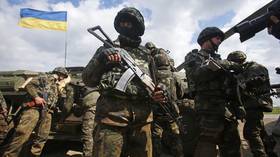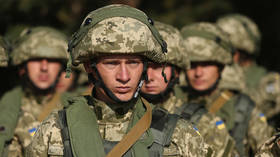Ukraine has new demand for Germany

Berlin must be bold and sign off on the transfer of lethal weapons to Kiev in the face of a purported Russian invasion, Ukraine’s ambassador to Germany has demanded despite the country’s constant refusal to back down on its decision not to provide the Eastern European nation with arms and ammunition.
Speaking to German news outlet dpa on Wednesday, Andrey Melnik renewed his calls for the German government to send hardware to the Eastern European nation, noting that while a delivery of 5,000 military helmets were welcomed, this is not enough.
According to him, this is a “purely symbolic gesture,” and merely a “drop in the ocean.” Instead, Berlin would do better to hand over weaponry to counter Russian aggression.
“We do not need tactics and maneuvering, but courageous action… which will finally provide Ukraine with German defensive weapons,” Melnik insisted, arguing that this is what the country’s people “need most of all today.”
The envoy also said that Kiev “is waiting for Germany to make a 180-degree turn and a real paradigm shift.”
His remarks come after Berlin’s Defense Minister Christine Lambrecht announced Germany would not send any weapons to Ukraine, but would be shipping 5,000 protective helmets.
Kiev’s Mayor Vitali Klitschko also poured scorn on the move and accused Lambrecht of not fully grasping that Kiev is “dealing with a perfectly equipped Russian army that can start further invading Ukraine at any time.”
“5,000 helmets are an absolute joke,” he said. “What will Germany send in support next? Pillows?”
Western leaders have sounded the alarm in recent weeks, claiming that Moscow could be planning to launch an invasion of its neighbor. However, the Kremlin has repeatedly denied the allegations and accused NATO of inflaming tensions on the continent.
Earlier in January, Melnik said Berlin had a moral responsibility for Ukraine’s future, and was therefore obliged to sell Kiev arms so the country could defend itself against purported Russian aggression. If not, he warned, there was a risk of “serious consequences for bilateral relations.”
However, Germany has pointed to its stated policy of not supplying weapons to conflict zones, a long-standing decision from previous governments which is also supported by the new coalition formed in December.
“In recent years, the German government has repeatedly decided not to supply lethal weapons. There are reasons for this, which are of course also based on all the developments of recent years and decades,” Chancellor Olaf Scholz said.













